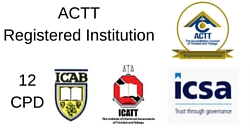This course examines the role and authority of a board and the relationship between board performance and its structure and membership. (2 day course)
The course will:
- Describe the board’s governance roles and responsibilities
- Differentiate managing versus directing and identifying dilemmas
- Discuss the role separation of chairman and CEO
- Analyze directors’ legal duties and liabilities
- Identify the characteristics and benefits of a balanced board
- Define types of directors and their leadership attributes
- Describe good practices in managing board directors’ roles, responsibilities, committees, and remuneration
- Identify good practices for effective board meeting preparation, conduct, and follow-up
- Clarify board meeting roles and responsibilities of the chairman, directors, and corporate secretary
READ A SHORT OVERVIEW OF PROGRAMME HERE
CCGI Faculty

Alison Kibirige
Mrs. Alison Dillon Kibirige is one of CCGI's distinguished faculty members. A global expert on corporate governance (Governance, Ethics, CSR and Risk Management), Alison has worked globally for over 25 years as a governance professional, previously as Secretary to the main Boards of Unilever and Barclays in London. She is a Fellow of ICSA and a UK solicitor. Alison was awarded the 2013 ICSA President’s Medal for Meritorious Service, the inaugural ICSA Company Secretary of the Year award in 2005 and has also won awards globally for her work with shareholders. READ MORE
Accreditation Status and CPD Approvals

The Certificate in Corporate Governance encompasses the core knowledge and awareness that are necessary to function effectively as a Director.
Target Group
The course is designed to meet the development needs of existing, new and aspiring members of and advisors to Boards of Directors, including:
- Chairmen
- Executive Directors
- Non Executive Directors (both newly appointed and experienced)
- Independent directors
- Company Secretaries
- Legal Counsels
- Consultants
READ FULL DETAILS AND CONTEXT HERE
The course is also designed to meet the development needs of senior managers who report to the Board or Board Committees or are members of the Executive Committee who are interested in expanding their knowledge and applied experience of boardroom activities, including:
- Executive committee members
- Vice Presidents
- General Managers
- Corporate Governance Executives
- Chief Risk Officers
- Internal Audit Officers
The course is relevant for directors and senior managers in:
- Multinational Companies (MNCs)
- Listed companies,
- Public Interest companies;
- State Owned Enterprises and Parastate Organisations;
- Unlisted and family companies;
- Not for Profit sector Organizations; and
- Partnerships
In addition professional executives with an interest in corporate governance may find the course to be relevant and useful e.g. media, judiciary, legal, accounting, finance and banking.
Goals of the Programme:
The Certificate in Corporate Governance encompasses the core knowledge and awareness that is necessary to function effectively as a director:
- An in-depth view of the role, responsibilities and legal duties of a director
- An understanding of the characteristics of an effective board
- Sound knowledge of financial terms and concepts
- The issues and processes associated with formulating strategic and business plans and achieving strategic leadership.
This is covered in a series of four courses and leads to the Certificate examination. The Certificate in Corporate Governance Programme has the following features:
- Certification based on assessment that contains a knowledge test.
- A core staff of qualified instructors. Many of the instructors will have attended a Training of Trainers Programme led by an International Finance Corporation Master Trainer.
- An advisory group consisting of both regional and international persons to guide the programme.
- The examination structure is based upon UK National Occupational Standards for Corporate Governance as our basis for us to accredit successful candidates.
The four modules of the Certificate in Corporate Governance Can be done in any order by participants so as to facilitate participation, reduce costs for participants, increase flexibility in dates and increase flexibility in educational choice.
Participants can also choose from at least two dates per year for the exam following all four modules and the successful completion of the written reflective assignment, following the completion of all modules.
